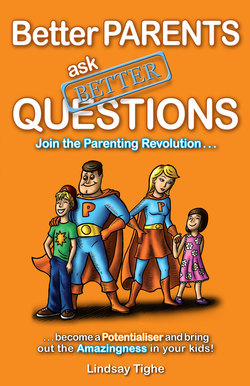Better Parents Ask Better Questions

Реклама. ООО «ЛитРес», ИНН: 7719571260.
Оглавление
Lindsay Boone's Tighe. Better Parents Ask Better Questions
Dedication
Acknowledgements
Illustrations
About the Author
Note from the Author
What people say about our workshops
Prologue
Introduction
Chapter 1. Parenting hats
The teacher/trainer/educator
The expert
The mentor
The ‘asker’ space
Chapter 2. Your role as parent
Self-reflection
Chapter 3. What else drives ‘telling’?
Changing your style
The ego
Chapter 4. Consequences of ‘telling’
Chapter 5. Beware creating the victim
How we become victims
Chapter 6. The hot potato
Handling victim responses
‘We’ versus ‘you’ language
Chapter 7. Questions. Big deal!
Everyone is amazing
I AM AMAZING
I AM AMAZING – PLEASE HELP ME TO REMEMBER THIS
Accountability
Motivation
The power of questions
Chapter 8. There are questions . . . and there are questions!
Open questions
Take care when using ‘Why’
What makes a question a Better Question?
Getting creative
IASKU model
Chapter 9. Qualities of the ‘asker’
Desire to change and your mindset
Trust
Self-awareness
Emotional self-check
Letting go
Leading questions
‘Quegesstions’
Should I ask or tell?
When to ask Better Questions
Time
Chapter 10. Listening skills to effectively question
Decision and focus
Paraphrasing and empathy
Listening traps
‘Own story’ listening
‘Own meaning’ listening
Make friends with silence
Chapter 11. Asking yourself Better Questions
The need for self-reflection
Guidelines for self-questioning
Be as specific as you can
Don’t be judgmental
Let it flow
Be totally honest
Good questions to use
Better Questions to be a better parent
Chapter 12. Practical applications for asking Better Questions
Scenario 1 — your child comes to you for help
Scenario 2 – feedback is required
Scenario 3 — getting tasks done
Scenario 4 — general development
Scenario 5 — reflection and learning
Scenario 6 — coping and dealing with problems and building resilience
Scenario 7 — managing their emotions
Chapter 13. Case studies and other tips
The 5-year-old
The wrong crowd
The rejection
Maths homework
What about the teddies?
Having fun learning
Tom the teen
Initial discussion
EXAMPLE OF HOW YOU CAN SUMMARISE YOUR DISCUSSION
Action planning
Progress review session
Ongoing process
The sleepover
The box
Big decisions
Other tips
Chapter 14. Reviewing and sustaining the practice
Chapter 15. A final thought
Join the parenting revolution . . . become a Potentialiser and release the AMAZINGNESS in your kids!
Epilogue
emodules available
Other resources available. Books
Cards
Forums
Websites
Отрывок из книги
Thank you to the humble question mark for inspiring me to inspire others about the topic of asking Better Questions. I am eternally grateful.
To my beautiful Mum who has always been a fabulous parent – I wouldn’t be who I am today without your care and guidance. THANKS, Mum!
.....
Having thought about it for a few seconds, I hope that you can see that firstly we believe the person with whom we are interacting, in this case your child, has knowledge, wisdom and expertise, and it is our role as the ‘asker’ to draw it out of them. To create a visual representation of this in your mind, please imagine that at the ‘telling’ end of the line you are using your hands to gesture a movement of rolling outwards, which represents the sharing of your knowledge and expertise. At the ‘asking’ end of the line, please imagine your hands moving in the opposite direction – a movement rolling towards you, which I think beautifully represents the role here as a Potentialiser to draw out that knowledge, wisdom and expertise in your kids.
I have shared this imagery with thousands of people in my workshops, and many people have said to me that the image of me standing there using my hands to represent the ‘asking’ to draw out knowledge, wisdom and expertise was so profound that they remembered it years later. Let’s hope it stays with you as a powerful reminder of the importance of enabling kids by asking them questions. Indeed, you will note that in the ‘asking’ space you bring a different belief about them. May I suggest that you see them as being resourceful, creative, knowledgeable and wise, with expertise that is far more amazing than even they realise. Remember, when you are at the ‘telling’ end of our line, your standpoint (often unconsciously) is that you don’t believe these things about them; in fact, you probably believe (or at least infer) that they know nothing. Another perspective that I often share here is that at the ‘telling’ end of the line it is all about you, whilst at the ‘asking’ end of the line it is all about them. Wow! How powerful to realise these things!
.....